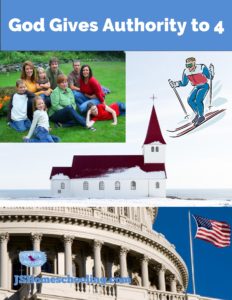Last year our church co-op studied American History and Literature, so this summer we followed up those government lessons with an intense week-long “seminar” to fill in all the little gaps that were left uncovered during the year. At the same time, I have been preparing to teach a Government, Citizenship, and Manners class for the elementary and middle school students in our church co-op. With all this focus on government I started to ponder whether most other homeschool families, and any other non-homeschool families, place their focus of government studies in the same place that we do.
We always begin our studies of government with the ultimate ruler. God set all things in place. God is the King of kings. God showed us how to best govern and most importantly, God delineated spheres of government. In other words, God delegates power in four distinct places. When we understand these and operate under their guidelines, government works much better.
To quote Meredith Curtis’ new book, Government, Citizenship, and Manner Class, “God delegates His authority to individuals, families, His Church, and sovereign nations. With His authority, He delegates responsibilities as well. God has an assignment for every person on this planet and families too. He also has an agenda for each sovereign nation and for His precious Church.” You don’t need to take her word for it. You can look it up in your own Bible.
Individuals
We have total control over our thoughts, decisions, and actions. We can choose right or wrong. Nobody else can make us think, do, or even feel anything. This is what it means to have individual authority. God has given assignments and responsibilities to each of us. Primarily we are to each live a life which glorifies God. According to the Word of God the first thing that we need to do is to accept Jesus Christ as our Lord and Savior. This means that we submit our lives to Him. We try our best to emulate Him. With this authority come the responsibility of accepting the consequences of our actions.
God gave people authority to own property as well. Even at the youngest ages we see people acting out a sense of ownership. How young were you or your children when they started saying, “Mine!”? While we often hear them say this because they are struggling with generosity and sharing, ownership is not bad. When we own things, we value them. We learn to take care of them. We learn to respect other people’s property too.
Families
As families we are called by God to train up our children, take care of one another, including our elderly relatives, and obey God’s mission for us. Some responsibilities of families are laid out very clearly in scripture. “Children, honor your mother and father that is will go well with you,” is a mother’s favorite verse to teach her youngsters. Children love to teach their parents, “Fathers do not exasperate your children.” Other lessons are little less obvious. When Paul tells Timothy about caring for widows he includes lessons about families taking care of them. He compares Christians who neglect their elderly womenfolk to Christians who are sexually immoral.
The Bible lays out a hierarchal structure for the family. This is not to define exactly who gets to boss whom. It is there to define who cares for whom. The father has authority so that he can take care of the wife and children. He gets the final say over his wife, because she, the godly woman, submitted to him, not because he forced her to bend to his will. He gets that final say, because he is ultimately responsible before the Lord for those decisions he makes for the family.
When parents make rules for children about what to eat, what to do for entertainment, what shows/movies to watch, when to sleep, what chores to perform on specific schedules, it is to train them to one day take care of their selves. Children are called to honor and obey their parents because that’s the only way that parents can train their children to honor and obey the Lord.
Families can own and manage property as well. With the individual we may focus on things like toys, clothes, or cars but with families we tend to think more along the lines of houses, land, and companies. As a family we work together to maintain the house. A family may work to clear and plant the land (or just mow the lawn). Generation after generation may work to keep a family business going strong.
The authority placed on families to train up their children in the way of the Lord is a driving force for many homeschool families. How can you properly train your children if you send them off to an institution to teach them whatever it deems fit, for 8+ hours per day? We must always remember that is why we homeschool. Once we remember that, we should remember to place Bible and Character training above Science and History on our priority list. Writing and Math are the tools which they will need to do well in all the rest of their education so put them at the top of the priorities.
The Church
God has delegated authority to the church. As you read through the Bible, especially the New Testament, you will see God-given assignments for the church. Some are spelled out and others are demonstrated. When you read about all the things that the apostles and the first century church did and said you will quickly be able to see a picture of church the way God intended it. He was even so gracious to show us how to deal with problems in the church.
While individuals are called to spread the Good News, the church is specially set apart to teach and spread the Gospel. Just read in Acts 2 and see what happened when all the apostles got together in the name of Jesus at Pentecost.
The Apostles did stop their work after Peter gave his great Gospel speech. They went on to fulfil the Great Commission, which Jesus gave them. They went throughout the known world and made disciples. That is still an important part of church authority and responsibility. Or at least it should be. Young Christians, like young children, need to be trained. This is the job of the church. Jesus did it. Paul and Peter did it. Your church should be doing it too.
In the process of discipling or training people, the church sometimes needs to deal with people who refuse to stop sinning. I recognize that nobody is perfect. The Bible even says that if anybody claims to never sin, they are a liar. That’s not what I’m talking about. That’s the occasional moment when we act out of character and sin. We repent and try not to fall into that trap again. There are some people who continue to sin habitually after they claim to be a Christian. This is a serious problem and the church has the authority to act.
Without going into a long dissertation about what people do wrong, why they do it, and what will happen to them if the church doesn’t perform its responsibility to discipline, let me just say God put the instructions into the Bible for a very good reason. First Corinthians talks about how the church needs to deal with a person caught in unrepentant habitual sin. That church listened to Paul and the man repented. We know that because in Second Corinthians, Paul tells them how to bring him back into the church.
Another area where the church has authority is the care of the poor. From beginning to end, the Bible offers many examples of taking care of the poor. It’s never the national government doing it, it’s the families and the churches. In the Old Testament, the poor would follow behind the workers and gather grain that the harvesters had missed. In the New Testament there are stories about the church working together so that nobody had too little. It also contains letters where the early church leaders were taught how to care for widows who have nobody to help them.
Sovereign Nations
God gave authority to sovereign nations. Even before He helped Moses to establish a system of judges to govern the Israelites, God set nations in place. They didn’t all follow His ways. They weren’t all blessed by Him. They each did, however, maintain rule of their people. God never wanted a whole world government. If anybody thinks he did, they need only read the story about the Tower of Babel.
In the Book of Exodus, Moses lays out the structure of the government as God wanted. Today there are many levels of government. In the United States, we have local, county, state, and federal or national governments. You should be able to see the similarity between the two systems because our founding fathers used the government that Moses set it up as a model. We have moved far from that today.
Basically the national government has a simple task. They are to protect the rights of their people. There needs to be people to make the laws which dictate how to do that. There needs to be courts to determine if those laws are being broken or obeyed. There usually needs to be some kind of administrator to help them all work together. The police help enforce. The fire departments protect the people’s property from fire. Nations need the military to protect them from other nations.
Nowhere in the scriptures does God ask the national government to solve “social issues”. Everything that can be lumped under that description is better handled at levels closer to home, if the government should deal with it at all. Without going into an entire government course here, I’ll just say that our local governments and states can and should be responsible for more of what goes on in a country.
Teach Your Children
I remind you of all this today because we all need to be teaching this to our children. It doesn’t matter if they are homeschooled or not. They need to understand this. If enough of our children understand the way government should work, maybe their generation will be the one to turn in back the direction it should go.
When you look for a government class to teach your children, look for these points. If the class does not talk about the spheres of authority designated by God, don’t use it. If your children are enrolled in a school which teaches a government class that leaves this out, work with them at home and teach it to them.
Read the Bible with them. Learn from it what God said and did about government. Then get involved in the process. Learn about the candidates and issues in your area. Vote at every election. Get your children to help you work at a campaign for somebody who understands the rightful place of government and will help this nation get back to it. Get involved in a church that takes seriously its role and place of authority. Most importantly, as a family and as individuals, seek God and obey Him with your whole being.
Until next time, Happy Homeschooling!
Laura Nolette
Pages: 1 2







